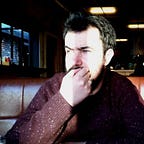Superheroes and ‘the Fantastic’
There is a hoary old chestnut in film circles that the cellphone ruined horror cinema. When the possibility of instant communication is everywhere, how can characters be isolated and picked off by the killer slash boogeyman du jour?
Some film-makers have resorted to arbitrary phone network failures. Or cell signals not able to escape the dark tunnel, cave, basement in question.
Others have taken the opposite approach and made the instancy of shared communication the object of the film’s scares. See the recent Unfriended for example, with its focus on horror in real-time courtesy of social media.
Of course this all boils down to horror having to move with the times, unpicking genre from the clichés and overused mechanisms of same. Technology has a knock-on effect on the fiction of its time. Dracula for instance is a novel about the race between telegrams and a vampire who travels by boat.
So where does this leave superhero comics?
Like horror cinema superhero comics have come to rely on a set of stock story tropes and narrative conventions. These were established long before your smartphone was assembled by overworked labourers in a godforsaken factory. What was fantastic in 1938 is not going to quicken the pulse of the jaded 2015 teen — nevermind the thirtysomething office drone — targeted by comic creators today.
Largely this is due to the nature of superpowers themselves and the form of wish-fulfilment they depicted.
Psychism, the ability to travel vast distances, remotely controlled destruction — all of these pulp era powers are passé in an era of phonecall-making cars, affordable flights around the world and of course 21st century drone warfare.
Superheroes were the bright-eyed and brilliantly smiling strong men, acrobats and magicians of the nineteenth century, reinvented for the comics page as caped adventurers. Just out of sight behind them the young reader of Detective Comics could still make out the spectacle of the travelling circus.
In the fast approaching future of the 1940s advances in science that would transform society — realize H.G. Wells’s dream of travelling to the moon and a weapon that could end life on Earth. The fantastic was dated almost as soon as it was birthed in the primary coloured pages of superhero titles.
Pulp superhero speculative fiction is rooted in the aspirational wish-fulfilment of working class Americans, second generation immigrants and young people facing a circumscribed future at too early an age. Wealth and decadence was on display within the close environs of the cityscape — is it any surprise the Waynes met their fate in an alleyway only a short distance from an expensive evening’s entertainment at the theatre?
Comic books reflected the class divisions of their time, but the tropes established by the creators would continue to be adopted and explored by their middle class, superhero-literate successors. At the same time science turned from the advancement of humanity as a species and catastrophic weapons of war, to convenience technology. The scientist left his underground lair decorated with Tesla coils and began selling hoovers on television.
The fantastical shifted to the convenient.
William Gibson’s quote ‘[t]he future is already here — it’s just not very evenly distributed’ feels apt here. The future of science did not bring us the utopias of pulp fiction, which superhero comics continued to riff off. Instead the comfort of middle-class consumers, home-owners, families became the focus of development. The problems of class, the iniquities of evil men in power, continued, but it is difficult to excite the same old passions of readers when happiness was a microwaveable meal in a well insulated living room watching Rowan and Martin’s Laugh-In.
Superpowers are a science fiction cheat — perhaps none more so than Stan Lee’s concept of the mutant ‘teen-agers’ in The Uncanny X-Men — attractive protagonists, with healthy dispositions and access to immense powers through little personal effort. The bourgeois superhuman leaves the prospect of utopia well behind, excellence is a question of birth, not effort.
What superhero comics transitioned from was a fiction of the fantastic — adventurers struggling to deal with the unknown, scientists working to change the world, as all around theartists and writers of these tales society was shifting and changing in unexpected ways — to a genre that focused on concerns of identity.
Compare these two characters. The immensely popular Spider-Man is a scientist, but first and foremost he is wracked by guilt over the death of his uncle. Superman is an ambassador from a far off technologically advanced alien civilization — and readers find him boring!
It does not matter that those early Stan Lee, Ditko, Kirby etc. comics from Marvel are now incredibly dated. They described a sense of what it was like to be alive in that time and place. That style continues — how do I feel now, about my life, about my interests. Whereas the DC books they trumped were still focused on the aspirational — genius scientists and benevolent millionaires.
The crux of the competition between Marvel and DC ever since has been which company can claw back more of a market share concerned with short-term, identity fiction. Is it any wonder one of the best DC series of recent years was Darwyn Cooke’s The New Frontier, a book that eulogises the legacy of the Distinguished Competition’s published storytelling, while embracing how the changes in American society would effect the superheroes? Cooke’s story is the perfect median between the fantastic and a sense of a particular period.
So my question is where do I go to find stories like that set in the here and now?
